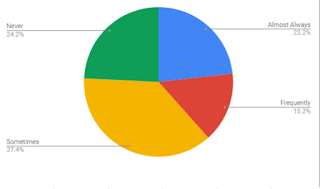Does learning come from success or failures? Research tells us it's a combination of both with some of the greatest learning the product of failure.
As an educator, one of my biggest challenges was finding each student's zone of proximal development. Much like bending a wooden pencil, you want to find that point where each pencil will bend but not break. Unlike the box of Ticonderogas, however, each student has a different breaking point.
Below are 8 ways we can can establish a classroom culture in which all students believe that they can be successful.
- Let students see you fail. In many ways I'm a pessimistic perfectionist. As a teacher that meant constantly developing new lessons, and as a coach, it meant constant tweaking of practice plans (reflectively I did too much altering). When I tried a new lesson, I often started off the lesson with a statement along the lines, "This is a new lesson for me, so it might be a little bit rough." At the end of the lesson, I sought students' feedback. Sometimes, especially when trying a new tech tool, I scraped the lesson before the next period.
- Ensure students have a map of what they are to learn. By sharing the targets and objectives and constantly checking for understanding through formative assessments, students will be able to see their progress and monitor their own learning. Of course, it's even more important for the teacher and student to use formative assessments to adjust teaching and learning in order to move towards the learning goal.
- Allow redos and retakes. We can't expect students to learn from failures unless we allow them the opportunity to relearn. We should allow multiple attempts at learning and assess the final product only.
- Provide growth-minded feedback. Effective feedback enables students to work through a process and lead to student actions to improve their work. Assess students by providing feedback on attention to detail, individual progress and effort.
- It's not about being first. Too often students race to finish. I had a teacher friend of mine who only gave A's on assignments if they were turned in early. Yikes! I much preferred the student who came in with the an assignment early so he/she could get feedback to guide their learning.
- It's not about being best. Education and learning are not about being the best. Helping students develop a growth mindset and grit, will enable students to go a lot further in life than the highest grade.
- Treat wrong answers as opportunities. Use wrong answers as a means to engage students in the learning process and knowledge construction. A simple trick I used was to simply say, "I haven't done a good job of teaching. Let me correct myself (followed by re-teaching)."
- Allow students to demonstrate learning in a variety of ways. Creative assessments and student choice allow students to learn and demonstrate their learning in a variety of ways, increasing their own motivation and accentuating their strengths.
What are some ways that you help students learn from their failures?
PS I need to apologize to Mr. Inman who I called Mr. Burton in last week's post. So embarrassing and thanks for calling me on it Mr. Kenneth (Burton) Inman.
Need to Knows
Our first club day went exceptionally well. It's not too late to sponsor a club. A couple of clubs reached capacity (or were real close) so if you'd like to co-sponsor any of the following clubs, let me know: Board Games, Book Club, Card Making, Crafts, Fishing, Random Acts of Kindness, and Soccer Club.
If you have a club that you would like to remain constant in regards to student population, my recommendation is that you create a group for your club's roster and limit the capacity to that number of students. We can also add a comment to that group if you'd like. Be forewarned though that many students want to try different clubs.
Mustang Mornings start tomorrow. I know it's early, but it's extremely important that we request students for Mustang Morning to be effective. Our study halls have reached capacity. It's also extremely important that when students sign up on Monday that we check to make sure all students have signed up for Mustang Morning sessions. We had over 250 students unassigned for many days this week. Let's make sure we catch the coughs before they turn into pneumonia.
Lockdown drill: 2:30 on Wednesday (required by code to have 2 in first 20 days)
Fire drill: 10:05 on Thursday (required to have 1 per week for first month)
PLCs
September 5: College Planning Night
September 6: Monticello Lead Teacher Meeting
September 7: Long Lunch A-Day (because of no school on Monday) with Mustang Morning.
Students/Teachers will follow Monday Mustang Morning Assignments (we'll have to see how that works in system)
September 11, 12: Underclassman Pictures
September 12: Back To School Night (schedule below)
Our first club day went exceptionally well. It's not too late to sponsor a club. A couple of clubs reached capacity (or were real close) so if you'd like to co-sponsor any of the following clubs, let me know: Board Games, Book Club, Card Making, Crafts, Fishing, Random Acts of Kindness, and Soccer Club.
If you have a club that you would like to remain constant in regards to student population, my recommendation is that you create a group for your club's roster and limit the capacity to that number of students. We can also add a comment to that group if you'd like. Be forewarned though that many students want to try different clubs.
Mustang Mornings start tomorrow. I know it's early, but it's extremely important that we request students for Mustang Morning to be effective. Our study halls have reached capacity. It's also extremely important that when students sign up on Monday that we check to make sure all students have signed up for Mustang Morning sessions. We had over 250 students unassigned for many days this week. Let's make sure we catch the coughs before they turn into pneumonia.
Lockdown drill: 2:30 on Wednesday (required by code to have 2 in first 20 days)
Fire drill: 10:05 on Thursday (required to have 1 per week for first month)
PLCs
- Use a data analysis tool (models in PLC Handbook) to analyze your pre-assessment
- Use data to begin discussing students
- Create SMART Goals
- Design Mustang Morning system to provide specialized instruction
- Upcoming: Meet with John (LTI), AVID team member, Beth Brown (Illuminate)
September 5: College Planning Night
September 6: Monticello Lead Teacher Meeting
September 7: Long Lunch A-Day (because of no school on Monday) with Mustang Morning.
Students/Teachers will follow Monday Mustang Morning Assignments (we'll have to see how that works in system)
September 11, 12: Underclassman Pictures
September 12: Back To School Night (schedule below)
Field Trips and SOLs
Stats of the Week
Birthdays
Thomas Warren: September 9
Shout Outs

Useful Information
The presentations and resources from the first couple of days have been added to the Monticello Team Drive on Google.
Don't forget to use the Shared Monticello Calendar.
Bell Schedules : http://bit.ly/MOHSbells
Morning Announcement Stream: http://streaming.k12albemarle.org/ACPS/links.htm
Announcement Request: http://tinyurl.com/requestannouncement
Worth Your Time
Students who earn at least 5 credits in 9th grade (this may equate to 6 in ACPS) and get no more one F in a core class are 3.5 times more likely to graduate on time. From the University of Chicago.
'America to Me Shows' Why All the Black Kids Sit Together in the Cafeteria
Back to School: Is the US Falling Behind in Education?
Back to School Night Schedule
Time
|
Period
|
6:30-6:55
|
Mr. Vrhovac’s Presentation in Auditorium
|
7:00-7:07
|
1A
|
7:12-7:19
|
2A
|
7:24-7:31
|
3A
|
7:36-7:43
|
4A
|
7:48-7:55
|
1B
|
8:00-8:07
|
2B
|
8:12-8:17
|
3B
|
8:22-8:29
|
4B
|



